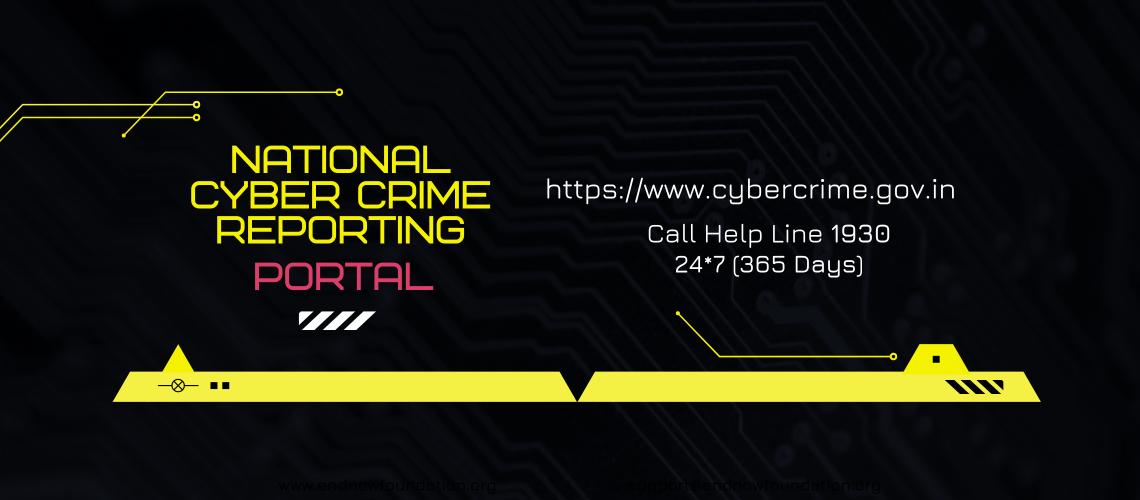How to Utilise National Cyber Crime Portal :
- The Ministry of Home Affairs has set up a dedicated platform for reporting cyber-crimes from anywhere across the country. Though it caters to all types of cyber-crimes, it puts special emphasis on cyber-crimes against women and children. Once a complaint is filed on this portal, it is forward to the relevant law enforcement agency nearest to the complainant. Ministry of Home Affairs has also started a helpline at 1930 which functions from 09:00 AM to 06:00 PM.
- You can file the complaint is both online and offline, and the victim can choose as per his/her convenience. The cyber-crime complaints can be registered with the designated cybercrime police stations at all three Police Commissionerate’s with in Hyderabad City (Rachakonda, Cyberabad & Hyderabad) and CID Office.
Complaining on National Cyber Crime Reporting Portal :
- (a) Register at https://cybercrime.gov.in/ (You will be required to use register via OTP from a valid Indian number)
- (b) Choose the Category and Sub-Category of Complaint
- (i) Report Crime related to Women or Children – (1) Child Pornography (2) Child Sexual Abuse Material (3) Sexually Explicit Content
- (ii) Report Other Cyber Crimes – (1) Mobile crimes (2) Social Media crimes (3) Online financial frauds (4) Cyber trafficking (5) Ransomware (6) Hacking
Process of Reporting Crime (Both Offline & Online) :
- Incident: (a) Mode of Communication (Internet, WhatsApp etc.) (b) Date & Time (c) Platform (Internet, WhatsApp etc.) (d) Upload Evidence (Screenshots of Payments / Bank Statement’s for financial frauds. For Harassment or any others attach related, Screenshots, Picture, Audio, Video etc.)
- Suspect Details (If Available) : (a) Suspect Name (b) Identity (Mobile, Email Etc) (c) Location (Workplace etc.)
- Complainant’s Details : (a) Full Name & Supporting Details (Father, Spouse, Guardian etc.) (b) Email ID / Phone Number (c) Address & ID Proof (Aadhar etc.)
Detailed Step by Step Procedure to File a Complaint :
- Report Crime related to Women or Children – https://cybercrime.gov.in/UploadMedia/MHA-CitizenManualReportCPRGRcomplaints-v10.pdf
- Report other Cyber Crimes – https://cybercrime.gov.in/UploadMedia/MHA-CitizenManualReportOtherCyberCrime-v10.pdf
Important Points to Remember :
- You can file a complaint in the nearest Cyber Crime Police Station for a quicker response
- You can also file a complaint on the Online Cyber Crime Portal Anonymously without giving your identity, the entire complaining process remains same, just that you don’t disclose who you are.
- Complainant is advised to block all communications from the fraudster and keep record of all communications as a backup and don’t delete any communication neither from the smartphone or the platform where the issue occurred.
Possible Cyber Crime Scenarios :
- Online Defamation – Publishing defamatory statements against an individual/organisation.
- Cyberbullying – Is a form of bullying that takes places using electronic technology.
- Obscene – Taking obscene pictures and videos of any woman engaged in private activities with the use of mobile phone or camera.
- Cyber Stalking – Use of electronic means to stalk or harass a individual or a company
- Pornography Content – Showing obscene / explicit pictures and videos through digital and online platforms.
- Cyber Theft – Stealing, data, financial information’s of an individual or organisation.
- Sextortion – Employs non-physical forms of coercion to extort sexual favours from the victim by blackmailing etc.
- Cyber Fraud (Phishing) – Is a fraudulent attempt to obtain sensitive information or data.
- Hacking – Hacking is a process of exploitation of a computer system or a private network inside a computer.
- Cyber Terrorism – Unlawful attack against computer, network and obtain the information about sovereignty and integrity of the nation.
Lost Money Online – Below is the Process For Quick Recovery :
The Citizen Financial Cyber Fraud Reporting and Management System has been developed in-house by I4C to integrate Law Enforcement Agencies and Banks and Financial Intermediaries. It is currently being utilised along with 1930 by 07 States and Union Territories (Chhattisgarh, Delhi, Madhya Pradesh, Rajasthan, Telangana, Uttarakhand, and Uttar Pradesh).
The facility empowers both the banks and the police, by leveraging new-age technologies for sharing online fraud-related information and taking action in almost real-time. The loss of defrauded money in online cheating cases can be stopped by chasing the money trail and stopping its further flow before it is taken out of the digital ecosystem by the fraudster.
It is currently utilised along with helpline: 1930 by few States and Union Territories (i.e. Delhi, Rajasthan, Telangana, Chhattisgarh, Uttarakhand, Madhya Pradesh, and Uttar Pradesh).
The facility empowers both the banks and the police, sharing online fraud-related information and taking action in almost real-time.
Step by Step Process
• Victims can call on Helpline no. 1930, which is manned and operated by the respective State Police officers.
• The Cyber Police notes down the fraud transaction details (Account Number, Wallet, UPI, Transaction ID, Date, Debit/Credit Card Numbers Etc) and other basic personal information of the caller and submits a Ticket on the portal
• The Ticket gets escalated to the concerned Banks, Wallets, Merchants, and so on, depending on whether they are the victim’s bank or the bank/wallet in which the defrauded money has gone.
• An SMS is also sent to the victim with an acknowledgment number of the complaint with direction to submit complete details of the fraud on the portal within 24 hours, using the acknowledgment number.
• The concerned Bank, which can now see the ticket on its dashboard on the Reporting Portal, checks the details in its internal systems.
• If the victim’s money is still available, the Bank puts it on hold, i.e., the fraudster cannot withdraw the money. If the victim’s money has moved out to another Bank, the Ticket gets escalated to the next subsequent Bank to which the money has moved out. This process is repeated until the money is saved from reaching into the hands of the fraudsters.
Conclusion :
- The new Gazette on Intermediary Guidelines and Digital Media Ethics Code 2021 has been introduced 25th February 2021, these guidelines will be of great help to Cyber-Crime Police Officers. There is a slippery slope towards surveillance culture challenging the very idea of being private and giving the opportunity for development of Artificial Intelligence to automate censorship? however these guidelines will help cybercrime police officers for quick (a) removal of information declared as unlawful by our courts (b) removal of information, that effects the online safety and dignity of users, especially the women. (c) Shorter time lines for concluding on cybercrime with the support of Statutory Compliance Officers, Grievance Redressal System and the Nodal Officers of the respective platforms.



